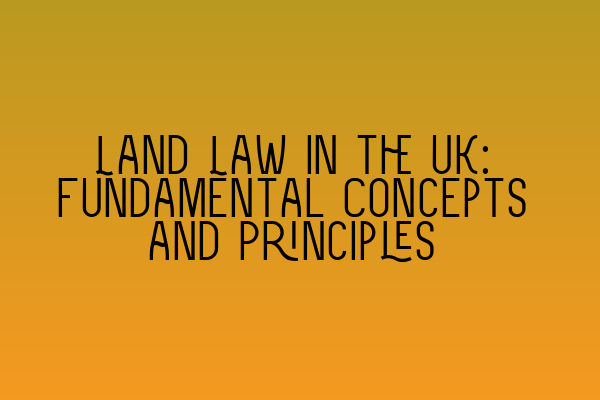Land Law in the UK: Fundamental Concepts and Principles
Understanding land law is essential for anyone involved in property transactions, whether you are a buyer, seller, homeowner, or landlord. Land law in the UK regulates the use, ownership, and disposition of land and is based upon a set of fundamental concepts and principles. In this article, we will explore these concepts, providing you with an overview of the key principles that underpin land law in the UK.
1. Ownership
Ownership is a fundamental concept in land law that determines who has the legal rights to a particular piece of land. In the UK, there are two main types of ownership: freehold and leasehold. Freehold ownership gives the owner complete ownership rights and control over the property, while leasehold ownership grants the owner a temporary right to occupy the property under a lease agreement.
If you are interested in the rights and responsibilities of parties involved in a contract, you can read more about it in our article on Parties in a Contract: Rights and Responsibilities.
2. Estates
Estates refer to the level or extent of ownership that an individual holds in a property. The two main types of estates in land law are freehold estates and leasehold estates. Freehold estates are considered the highest form of ownership and can last indefinitely, while leasehold estates are limited by the terms of the lease agreement.
3. Tenure
Tenure refers to the legal relationship between the owner of the land and the occupier or tenant. In the UK, the most common form of tenure is the leasehold system, where the owner grants a lease to a tenant for a specific period of time. Tenure also encompasses concepts such as rights of way, easements, and covenants that govern the use and enjoyment of the land.
If you want to learn more about duress and undue influence in contracts, make sure to read our related article on Unveiling Duress and Undue Influence in Contracts.
4. Trusts
Trusts are legal arrangements where one person, the trustee, holds the legal ownership of the land for the benefit of another person, the beneficiary. Trusts are commonly used in property transactions, such as when parents hold property on trust for their children or when property is held in trust for charitable purposes.
5. Conveyancing
Conveyancing is the process of transferring ownership of land from one person to another. It involves various legal and administrative tasks, such as conducting searches, preparing contracts, and registering the transfer of ownership with the Land Registry. Understanding the conveyancing process is crucial for both buyers and sellers to ensure a smooth transaction.
If you want to understand the backbone of contracts, we have an article on Essentials of Consideration: Understanding the Backbone of Contracts that you might find helpful.
6. Land Registration
Land registration is the process of recording details of land ownership and interests in the Land Registry. It provides transparency and security of ownership, allowing potential buyers to carry out searches and investigate the title before purchasing a property. Registered land enjoys a higher level of legal protection compared to unregistered land.
7. Adverse Possession
Adverse possession is a legal principle that allows a person to claim ownership of land they have occupied and maintained without the owner’s permission for a specified period of time. It is a complex area of land law that requires fulfilling certain criteria, including the intention to possess the land and exclusivity of occupation.
If you are interested in assessing financial compensation in contract law, take a look at our article on Damages in Contract Law: Assessing Financial Compensation.
8. Landlord and Tenant Law
Landlord and tenant law governs the rights and responsibilities of landlords and tenants in relation to leasehold properties. It outlines the obligations of both parties regarding rent payments, repairs, maintenance, and termination of the tenancy. Understanding landlord and tenant law is crucial for both landlords and tenants to ensure a fair and lawful relationship.
9. Planning and Development
Planning and development laws regulate the use and development of land in the UK. Local planning authorities are responsible for granting planning permissions and enforcing planning regulations to ensure that land is used in accordance with the local development plan. Compliance with planning and development laws is crucial for property owners and developers to avoid potential legal issues.
If you want to decode the components of agreement in contracts, we have an informative article on Express and Implied Terms in Contracts: Decoding Agreement Components.
Conclusion
Land law in the UK encompasses a wide range of concepts and principles that govern the use, ownership, and disposition of land. Understanding these fundamental principles is crucial for anyone involved in property transactions to ensure legal compliance and protect their rights. Whether you are a buyer, seller, homeowner, or landlord, consulting a professional property solicitor can provide you with the necessary guidance and expertise to navigate the complexities of land law.
